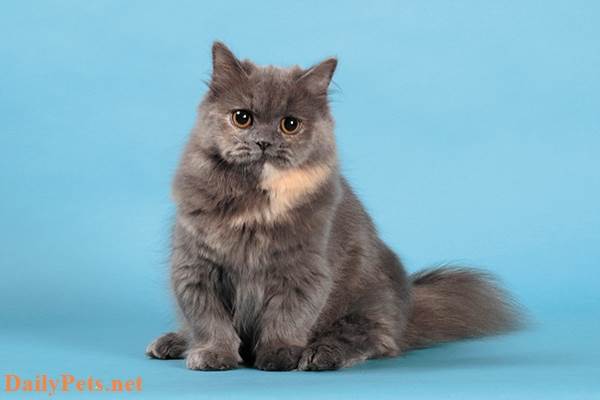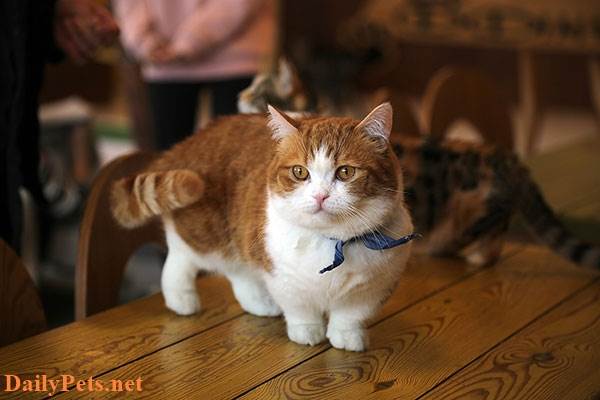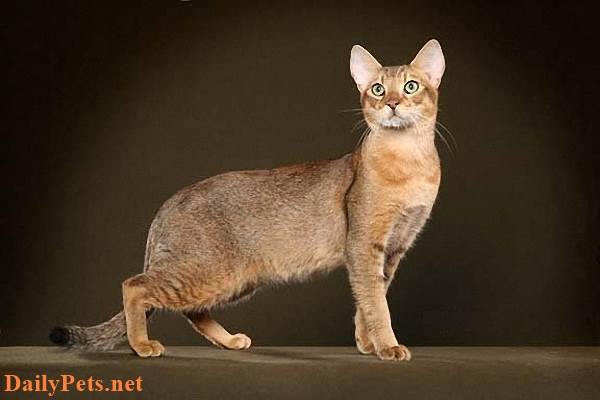The Napoleon Cat is a relatively new breed known for its distinctively short legs and a face often described as “doll-like.” It has gained popularity as one of the most beloved cat breeds today.
Let’s explore the origins of the Napoleon Cat – Minuet Cat, its characteristics, care, and pricing with DailyPets.net!
Origins of the Minuet Cat (Napoleon Cat)
The name “Napoleon Cat” is an older designation, and nowadays, it has been changed to the Minuet Cat. The International Cat Association (TICA) categorized the Napoleon Cat as a hybrid breed within the domestic cat group. This breed is a combination of two unique breeds: the short-legged Munchkin Cat and the flat-faced Persian Cat.

Minuet Cat (Napoleon Cat).
Joseph B. Smith, a breeding expert with a particular fondness for Munchkin Cats, desired to create a breed with short legs like Munchkin Cats but possessing a cuter, more doll-like face. He decided to crossbreed Munchkin Cats with Persian Cats to create the adorable Napoleon Cat with features that met his requirements:
- The Napoleon Cat must have short legs similar to Munchkin Cats.
- The head and eyes of the Napoleon Cat should be larger and rounder.
- The nose of the Napoleon Cat shouldn’t be as flat as that of a Persian Cat.
He had these requirements because he wanted the Napoleon Cat to blend the strengths of both Munchkin and Persian Cats. The large, round eyes of the Persian Cat, the cute short legs, and a nose that isn’t too flat, like the Munchkin Cat.
Additionally, the Napoleon Cat has reduced susceptibility to respiratory issues. However, being a hybrid breed, Napoleon Cats can exhibit a wide range of variations in their offspring due to the combination of two distinct breeds. Smith put significant effort into breeding, developing, and promoting the breed. In January 2015, TICA officially recognized his Napoleon Cat breed and renamed Minuet instead of Napoleon for various objective reasons.
Personality Traits of the Minuet Cat
The Minuet Cat is an excellent choice for those who love cats and have children at home. Minuet Cats inherit Munchkin Cats’s playful and sociable nature, combined with the sweetness and charm of Persian Cats. Minuet Cats can quickly adapt to anyone and love playing with children. They are also gentle and get along well with everyone, including other pets in the house.
One lesser-known skill of Minuet Cats is their talent for climbing and jumping. Unlike many cats that tend to be lazy and lounge around the house, Minuet Cats find joy in leaping and may consider it a form of exercise. Witnessing their jumps is sure to leave anyone in awe.
Reasons to Adopt a Minuet Cat
Minuet Cats can comfortably coexist with families with young children, who are always attentive and playful with kids.
Minuet Cats easily integrate with other pets under the same roof.
Having a Minuet Cat can help alleviate stress and provide companionship. Therefore, choosing to live with a Minuet Cat is an ideal decision.
Caring for a Minuet Cat
Feeding for Minuet Cats
You only need to pay attention to their dietary needs in each meal, providing them with well-balanced, nutritious cat food, homemade patés, canned patés, or they can even eat the same food you have.
Grooming for Minuet Cats
Taking care of a Minuet Cat is not particularly challenging. Since you acquired the breed, it has already been selected to eliminate nasal and leg issues. Therefore, you should focus on ensuring they receive proper daily nutrition for their development.
Their long fur necessitates a dedicated brush for grooming and specialized cat shampoo to prevent fleas. Do not use your hair products on them.
Common Health Issues in Minuet Cats
Minuet Cats are generally considered a healthy breed. However, as Munchkin and Persian Cats hybrid, they can still be prone to health issues similar to those of these breeds. Some common health concerns for Minuet Cats include:
- Cataracts
- Lordosis (spine issues)
- Polycystic kidney disease
Important Notes for Minuet Cat Care
Adopting a Minuet Cat from reputable sources is advisable to avoid health issues and ensure they have received the necessary vaccinations before bringing them home.
Regular veterinary check-ups for your Minuet Cat are recommended every 6 to 12 months to ensure their well-being. Stay up to date with vaccinations and deworming on schedule. If you do not plan to breed or reproduce kittens, consider spaying or neutering your cat at around 5 months of age to help them live longer.
Minuet Cat price
The price of a Minuet Cat can vary widely depending on several factors, including the cat’s pedigree, age, color, and the breeder’s reputation. On average, Minuet Cats from reputable breeders can range from $1,000 to $3,000 or even higher. Some Minuets with exceptional pedigrees or unique color patterns may be more expensive.
Purchasing a Minuet Cat from a responsible breeder who follows ethical breeding practices and properly cares for the cats is essential. Remember that the initial cost of acquiring a cat is just one part of the expense; you’ll also need to budget for ongoing care, including food, veterinary care, grooming, and other supplies.





